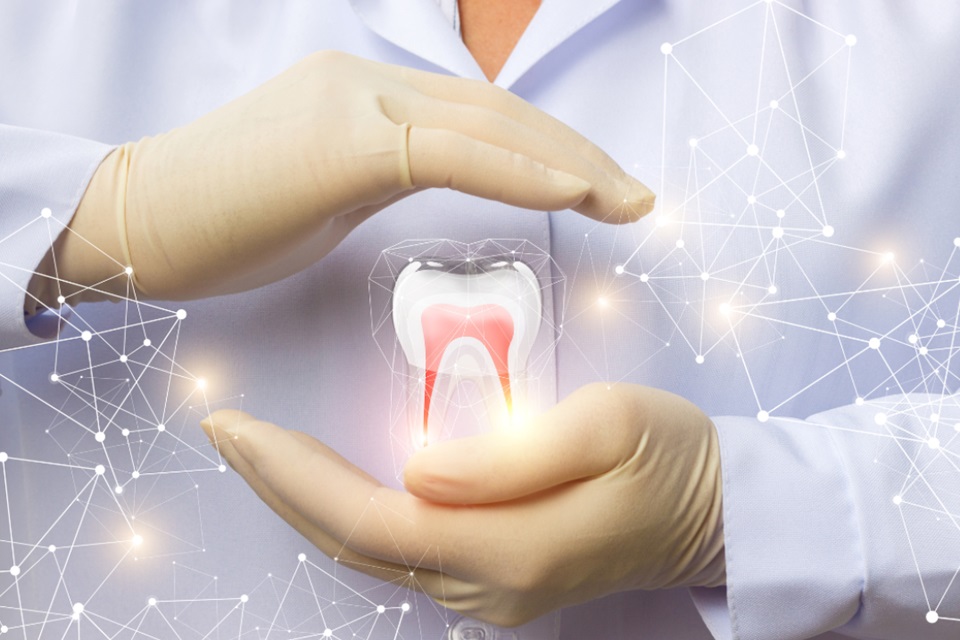It often seems like the older we get, the more we wish we’d cared for our teeth better when we were younger. But no matter where you are in your stage of life, if you still have your natural teeth, it’s not too late to learn how to care for them properly.
Maintaining optimal mouth health is the effect of ongoing positive habits extending beyond the bathroom. Here, we’ll discuss the top five practices you should include in your routines to ensure your teeth and gums are as healthy as possible.
Table of Contents
1. Brush Twice A Day
You may have been taught to brush twice daily, but do you know why that habit is so important?
It all goes back to science. Microorganisms like bacteria and plaque thrive in damp, dark, and warm environments, which makes your mouth the perfect breeding ground for these little creatures.
While most bacteria are vital to your health, you still don’t want them to overpopulate. When that happens, the buildup of plaque and tartar on your teeth and gums causes tooth decay and gum disease.
Brushing first thing in the morning removes all the bacteria and other microorganisms that reproduce in your mouth while sleeping. Brushing before you go to bed removes all the germs that pile up in your mouth throughout the day, preventing them from multiplying overnight and getting into your system.
2. Brush Correctly
The frequency and time of brushing are crucial, but did you know how you brush matters, too?
Start by using a medium or hard-bristled toothbrush unless your dentist tells you to use a soft one. Then, consider the movements you make while brushing.
Proper tooth brushing involves moving the brush gently in small circles. This movement is the most effective way to remove plaque. Get over all the surfaces, including your gums and tongue. If the plaque isn’t removed, it can harden, turning into calculus buildup and leading to early gum disease called gingivitis.
Many of us forget to brush our tongues. Yet, plaque can also build up there, causing bad breath and leading to more severe health problems.
3. Use The Right Toothpaste & Floss
Most toothpaste brands have fluoride, and unless your doctor or dentist tells you otherwise, you need that ingredient in your product. Fluoride is a mineral that defends your enamel from the germs that cause tooth decay and forms a protective barrier over your teeth.
Flossing should be completed alongside brushing once a day. When you floss, you pull those particles from your teeth that might otherwise be stuck there for a while. This action also stimulates the gum tissues, reducing inflammation and knocking out plaque buildup.
If you don’t know how to floss correctly, use a dental flosser instead of the strings. Those with braces can ask their orthodontist for instructions on how to floss properly.
4. Stay Hydrated With Water
You hear everyone talk about the importance of drinking water for your health, but it’s not just about hydration. If you’re not consuming water after every meal, you’re letting the food particles you ate hang out in your mouth.
Many people assume that drinking any beverage is enough to keep them hydrated, and in some cases, it does work. But every flavored beverage has some kind of particle in it that can damage your enamel. Rinsing your mouth with a glass of water after meals washes out much of the sticky or acidic ingredients you ingested.
If water isn’t your thing, you can supplement it with mouthwash. Rinse your mouth twice a day to reduce acid, get rid of bacteria in hard-to-reach areas, and swish the food particles from your teeth.
5. Consider What You Put In Your Mouth
Healthy oral habits extend beyond brushing and flossing. Everything you put in your mouth has the potential to be good or bad for your teeth and gums. For example, chewing on pen caps and your nails puts unnecessary bacteria in your mouth and will, over time, damage your enamel.
Eating crunchy foods, like apples and carrots, are healthier for your body overall. They have the necessary vitamins and minerals you need for optimal wellness and are good for working your jaw muscles and cleaning your teeth.
Avoid sugars and acids, both of which lead to enamel erosion. Beverages like tea, coffee, and soda can damage and discolor your teeth. You don’t have to stay away from them forever, but limit your intake and clean your mouth after you eat or drink them.
Your retainer and night guard are other things to be cautious about. You put them in your mouth, and germs build up overnight on those oral appliances. Be sure to wash your appliance regularly to prevent those microorganisms from thriving in your mouth each time you wear it. This article by JS Dental Lab explains more about how to clean your night guard.
Conclusion
With these five practices in your daily routine, as well as a visit to your dentist twice a year, your teeth should be safe from most of the dangers that are caused by germs in your mouth.



